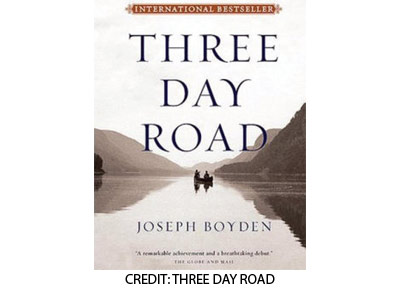The Three Day Road

Growing up in Canada, I heard many stories about World War I in school. I heard about Vimy Ridge, the Somme and Ypres. I heard about trench foot, no man's land and came to recognize the poppy as an iconic symbol in Canadian history. What was never mentioned was the role that Native Canadians played in the war, even though approximately 3,500 to 4,000 Native men enlisted and went to the European battlefields.
Canadian author Joseph Boyden, who is part Native and part Irish Catholic, presents insight into the unique challenges faced by Natives in World War I in his 2005 novel Three Day Road. Loosely based on the real-life Native war hero Francis Pegahmagabow, the book tells the story of two young Cree men, Xavier Bird and Elijah Weesegeechak (also known as Whiskeyjack) from Northern Ontario who volunteer for the war and become skilled snipers.
Xavier, having grown up in the wilderness with his aunt Niska, has expert hunting and survival instincts, whereas Elijah, who spent most of his childhood in a residential school, didn't begin learning these skills until he escaped with Niska and Xavier to live in the woods.
By using two characters is his novel, Boyden is able to examine two different experiences during the war. Xavier, who speaks very little English, struggles with proving himself to the other soldiers and, like his life in Canada, remains focused on survival. Elijah, who speaks flawless English, wins over his comrades with storytelling and begins to thrive on his kills and an addiction to morphine.
Interwoven throughout Xavier's narrative about the gruesome life in the trenches is the voice of Niska. Her story begins at the end, when Xavier returns home from the war injured and haunted by his memories. As she paddles the three-day journey from Moose Factory back to her camp, she tells Xavier stories from throughout her life, sometimes aloud and sometimes in her head, in an effort to rid him of his pain.
The book is rich with accurate accounts of life in the war — the fear, the exhaustion, the loneliness and the brutality. Unlike other World War I novels, Three Day Road is also full of Native culture. The recurring theme of the windigo, a cannibalistic mythical spirit that can possess humans, ties the various narratives together throughout the novel. The style of storytelling, the use of non-translated Cree words, tons of symbolism and, as Boyden has described it, the cyclical style of the book add another dimension and room for interpretation.
Three Day Road is Boyden's first novel, and what makes it so poignant is his expert use of language. The narrative is told in the voices of Xavier and Niska, some parts told by Niska to Xavier, some Xavier to Niska and others by Xavier to himself.
Transitions happen without the reader even being aware of them, taking the reader from the wilderness of Canada to the trenches in France.
"I stare up at the rain that falls down, flickers of lightning cutting through it every few minutes. My body floats above itself. Oh, this medicine is good. I hear my breathing, how the air floods in slowly then recedes from me like waves on a beach. I listen to myself breathe, and I close my eyes. After a time I can hear others breathing all around me. I want to tell them to go quiet. Lightning, another flare, pops up out of the darkness and throws a white light on us and on the ditch we live in, our uniforms soaking up the cold water. Elijah is not near. So long has Elijah been around that he is like a part of my own body."
The strength of Boyden's story weaves fluidly from violence to romance, sorrow to joy, fear to bravery and life to death. His style captivates the reader, pulling you through each and every emotion, making this book nearly impossible to put down.













